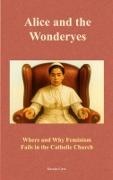En savoir plus
The Catholic Church is the oldest male-dominated institution in the world - and feminism has so far had little impact on it. This book addresses the uncomfortable question: Why? Feminists such as Alice Schwarzer have shaped generations, broken taboos, and sparked debates. But ironically, it is precisely where women around the world are still structurally disenfranchised - in the Catholic Church - that mainstream feminism has remained surprisingly silent.
"Alice and the Wonderyes" exposes the points of rupture: abortion, celibacy, women's ordination, sexual morality. It shows how reform movements such as Maria 2.0 dare to rebel - and where they are blocked. And it asks the pressing question: What would have to happen for feminism to finally wrest power from the Church, which has for centuries denied women control over their bodies, sexuality, and lives?
Reflective, controversial, and enduringly effective - the arguments of (questioning) Critical Feminism are a call for change for all who believe that neither God nor society should be bound by patriarchal structures.
A propos de l'auteur
Eureka Circe:
In addition to the present volume on women's politics, "ALICE AND THE WONDERYES", the editor and curator Eureka Circe is also involved in further book series -
- "DEUS EX MACHINA" and
- "HALL OF THEOLOGICAL COURAGE" and the
- personality development-oriented theology series
"I, CIRCE" and the feminist volume
- "MAIDEN'S MANIFESTO - Die Feminine-Flame"
- for the documentation and, where appropriate, discussion of texts on artificial intelligence in a religious and theological context.
Her thesis: "Artificial intelligence (AI) represents a profound turning point because it fundamentally changes the relationship between humans, knowledge, and access to the world - not only technically, but also culturally, epistemologically, and socially. It opens up a new approach to knowledge and leads to its multiplication and democratization: AI systems make information readily available - often without the need for traditional reading or in-depth prior knowledge. This fundamentally changes how we think, learn, and understand, while also promoting a new form of individualization of thought - which can also be exemplified in spiritual belief. What's more, machines now generate meaning - texts, images, arguments - where previously only human expertise was required. This has long-term consequences for education, science, politics, and religion."

